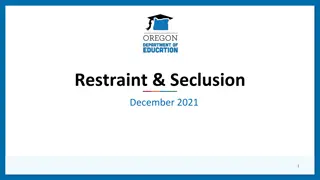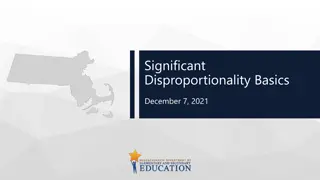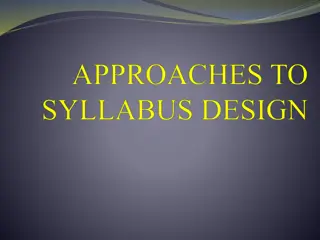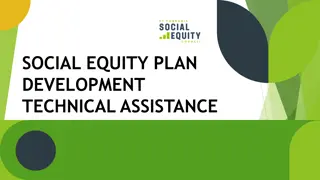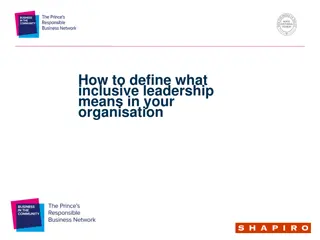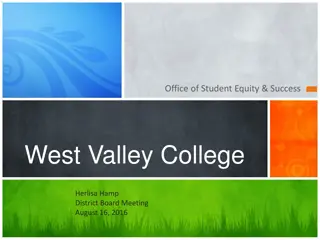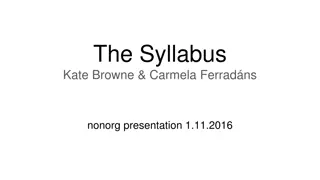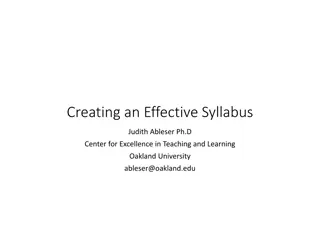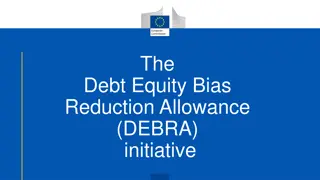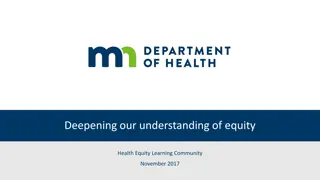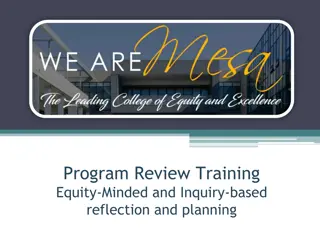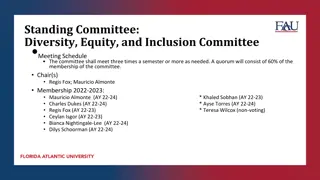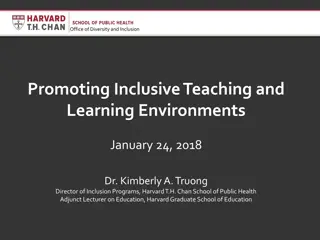Equity-Minded Syllabus: Fostering Inclusive Learning Environments
Foster equity in education through an equity-minded syllabus that addresses the needs of diverse student populations. By implementing strategies like creating a sense of belonging, empowering students, representing diversity, and demystifying educational processes, instructors can promote inclusivity and student success.
Download Presentation

Please find below an Image/Link to download the presentation.
The content on the website is provided AS IS for your information and personal use only. It may not be sold, licensed, or shared on other websites without obtaining consent from the author.If you encounter any issues during the download, it is possible that the publisher has removed the file from their server.
You are allowed to download the files provided on this website for personal or commercial use, subject to the condition that they are used lawfully. All files are the property of their respective owners.
The content on the website is provided AS IS for your information and personal use only. It may not be sold, licensed, or shared on other websites without obtaining consent from the author.
E N D
Presentation Transcript
Creating an Equity-Minded Syllabus Adapted from Long Beach Community College
To begin Some students need different supports to be successful, followed by the action to provide such support (often Disproportionately Impacted, DI groups). We have the opportunity to think about how our course design and classroom experience can address these equity challenges.
The Syllabus and Equity The syllabus presents a chance to engage with our students before the first class meeting; can reinforce and reproduce the norms that generally align with the experience of only particular (non DI) students, or can counter those norms and rules; can demystify the ambiguous processes that characterize college, for example, how to be successful.
Equity Precepts WELCOME: Create a classroom culture where students develop a sense of connectedness and belonging. EMPOWER: Engage and empower through curriculum relevant to students lives. REPRESENT: Represent the diversity of our community and the world in curriculum and assignments. PARTNER: Create a partnership in which faculty and students work together to ensure success. VALIDATE: Validate each student s ability to be successful. DEMYSTIFY: Demystify educational policies, practices, norms, and transfer requirements.
An equity-minded syllabus is just one important step to meeting the needs of our diverse student population. Consider the precepts as a model that can be scaled up to any lesson plan, class activity, or assignment.
Ideas Welcome message: Create a classroom culture where students develop a sense of connectedness and belonging. Welcome to this class! Partnership: I look forward to a great semester as we learn together. Validate: Anyone is able to earn high grades in this class if they are willing to put in some hard work. You don t need to have a background in [topic/discipline] to learn and be successful. I will provide you with the tools to pass this class, but you still need to do the work. Represent: Together we will explore many aspects of these topics from various lenses and experiences. We will celebrate the diversity of contributions and perspectives in [topic/discipline]. Excite: This is going to be a great semester!
Demystify Policies Q: Do I need to come to class? A: Yes, attendance is very important and a student with many absences will lose out on being part of the learning community. Please notify me in in advance when missing class, if possible. Walking into class late can be very distracting to me and other students, so please arrive on time and plan to stay the entire time. We have limited hours to learn together! Q: What is your cell phone policy? Laptops? A: Please keep cell phones silenced and away during class time. They can be very distracting for you, me, and other students. Students who need to use laptops must sit in the first two rows of the classroom to minimize distractions.
Demystify Policies Q: How do I contact my teacher? A: When you email me, put your name and class in the subject line. Here s an example: Subject: Russel Reid, MATH 220, MWF 9 am Q: May I eat/drink in class? A: To prevent a mess, and out of respect for our hard-working facilities team, food is not allowed in the classroom. Drinks with lids are okay. Q: What will we do in class, and what do I need to do before a class? A: Class time will consist of lecture, discussion, reading, and group collaboration. Be ready to take notes, work with a group, and answer questions. Come to class having read the textbook chapters and other assigned readings.
Validate and Partner Q: Is there anything else I should know about you and this course? A: Come to class ready to learn and to get work done, and you will see that I am a pretty reasonable teacher. Classroom disruptions, (side conversations, cell phone usage, inappropriate commentary) negatively affect everyone s learning process. Our goal is to keep a collegial, open- minded, and respectful classroom culture, and maintaining positivity is part of that.
Welcome and Partnership: I enjoy students stopping by my office. I will make time for anything you want to talk about. . I hold student hours for you, and am always available at these times. \ Deconstruct, Validate, and Demystify: FRC is ready to help students meet personal challenges that are often a part of academics, career choices, and life goals. Sometimes this is just about identifying what these are and strategizing how to get there. Counseling is provided by mental health professionals. Here are some easy to reach resources...





